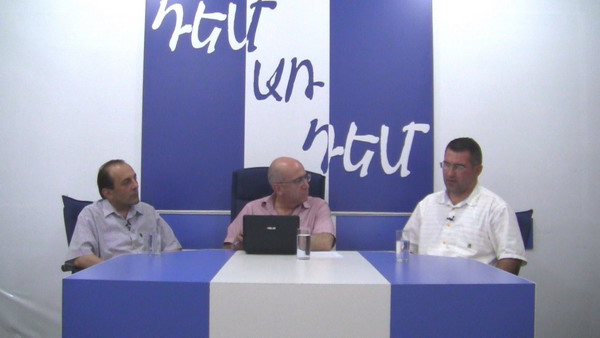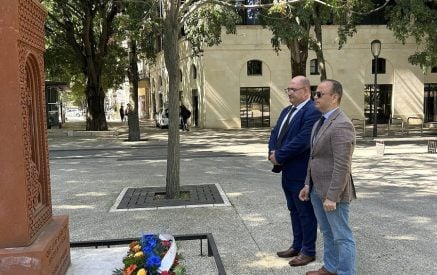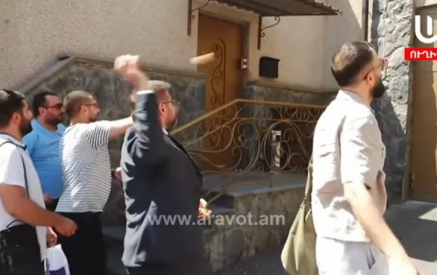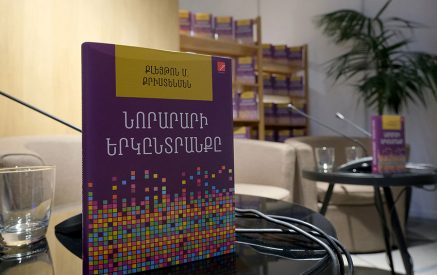The topic of “Aravot” online “Face to Face” on the air is discussed between Deputy-Chairman of “Heritage” party, Armen Martirosyan, and political scientist, Ruben Mehrabyan.
Aram Abrahamyan – There was a very tense situation on the border for 3 days. What objectives has Azerbaijan set forth? Why did it initiated them?
Armen Martirosyan – I think everything, so to speak, began from the moment when after the rigged elections, Serzh Sargsyan made a “fateful” decision on September 3; he made a statement on Armenia’s accession to the Customs Union. Since then, perhaps, most of the components of the clock’s mechanism of today’s situation began to work. It is not only due to the fact, it is also the Azerbaijani domestic factor, but the main thing, I think, is this. In fact, we were deprived of the right to be an international actual subject, and Azerbaijan became more interesting for the players. Both, Russia and the West are trying to attract Azerbaijan to its field. Now, it is trying to strengthen Azerbaijan’s positions, in diplomatic and political terms. Secondly, Azerbaijan has domestic political problems, we saw that in the recent period, various ambassadors, including the Ambassador of the United States, stated that a color revolution is expected to Azerbaijan and so on, and we constantly see that recently human rights defenders and people with opposition views are arrested.
A. A. – If it were not for September 3, won’t Azerbaijan attack us?
Read also
Ruben Mehrabyan – I do not think that it is directly related to each other, but we have to say that if it were not for September 3, our current foreign political situation would have been much better than it is now. The question has two dimensions, Armenian-Azerbaijani, that is, the core conflict, and the other is the international dimension. The context of the core conflict is the same. Azerbaijan will always try showing that the current status quo does not ensure peace, and it should be changed and gradually going through such aggravations, it keep reminding about it. With regard to international dimension, it should be noted that Russia gives a “heart” to this kind of brazen behavior in Azerbaijan by supplying offensive weapons, and also supporting Aliyev’s regime when he was criticized by the West. In all international dimensions, Russia is number one advocate of Azerbaijan on these matters. Russia views Aliye’s regime as an intimate regime, because they are alike by all the parameters. Plus Turkey’s unconstructive position. It reaches the point that this country extends its condolences to the victims only by the Azerbaijani side, and this is done by the foreign minister’s level. It just does not fit within any circles, both intelligence and morality.
A. A. – Azerbaijan, therefore, does not set an objective, at least for now, to conquer some lands, it realizes that it cannot do it, and simply strains the situation with such political objectives.
A. M. – Naturally, this was somehow also a test of power, it was an experiment of whether Azerbaijan can obtain something at some point with a wide-scale war. Fortunately, thanks to the self-sacrifice of our soldiers, once again, it was proved that it would not happen, and Azerbaijan has no chance to reach success in case of a wide-scale war.
A. A. What do you think is this consciousness available in Azerbaijan?
A. M. – I think, it is. I think it became clearer for them that no matter it increases the tension, the number of actions and magnitude, anyway, the answer would be greater. Moreover, our Defense Ministry released a timely statement that a counterblow in the strictest manner will take place. The matter was not even about proportionality, but the severity, which I think is very true.
Prepared by ARAM ABRAHAMYAN
“Face to Face” talk show series are released by the Open Society Foundations- Armenia. The views and analyzes found in this broadcast express the opinions of the participants, and are not approved by the Open Society Foundations-Armenia, or its Board. This broadcast is made available thanks to comprehensive financial support by the Open Society Foundations-Armenia, under the mass media support program, grant No 18624.






















































